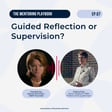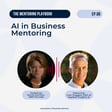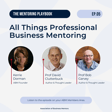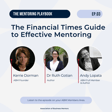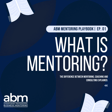Become a Creator today!Start creating today - Share your story with the world!
Start for free
00:00:00
00:00:01

Active Listening in Business Mentoring.
In this month's episode of the ABM Mentoring Playbook, ABM founder Kerrie Dorman speaks with ABM Full member Jonathan Ratcliff about the art of active listening.
Throughout this episode, Kerrie and Jonathan dive deep into the importance of truly hearing your mentee, the techniques to enhance your listening skills, and how active listening can transform mentoring relationships. Whether you’re a seasoned mentor or just starting out, this episode offers practical tips and real-world examples to help you become a more effective and empathetic mentor. Tune in to discover how active listening can make all the difference in your mentoring journey.
Recommended
Transcript
Introduction to Mentoring Podcast
00:00:01
Speaker
Hi, welcome to the ABM Mentoring Playbook. This is your podcast on all things mentoring, tools, techniques, and best practices.
Who is Kerry Dorman?
00:00:12
Speaker
I'm your host, Kerry Dorman. I'm the founder and chief ambassador of the Association of Business Mentors. And every month I'm going to be speaking with an expert guest about a specific tool to help you elevate your mentoring practice.
What are Effective Mentoring Techniques?
00:00:26
Speaker
So without further ado, let's crack on to this month's episode.
00:00:32
Speaker
Good morning, Jonathan Ratcliffe. Thank you very, very much for joining me on the Mentoring Playbook podcast here at the ABM. I've been really looking forward to discussing this topic with you. And um first of all, I just need to introduce you to our listeners. You are a long-standing ABM member and you specialise your mentoring around sales and sales strategies amongst I know lots of other wonderful good things but have I got that right?
00:01:03
Speaker
Yeah, that's a ah good way of describing it. My um business so ah consists of two aspects. So it's mentoring and coaching of senior leaders, but it's also consultancy. um And therein lies something of a conundrum because as we know, ah consultancy is where you're expected to provide answers.
00:01:27
Speaker
And coaching is at the other end of the extreme where you're trying to help people to get answers to their own issues and mentoring lies somewhere in between, fortunately. I like that. And we are going to be talking today on the hot topic of listening.
Why is Slowing Down Beneficial in Mentoring?
00:01:45
Speaker
And I just want to remind you of the the wonderful conversation we had preparing for this podcast. And I came online and we were on Teams and we were talking about listening.
00:01:57
Speaker
And as you quite rightly pointed out is that I have a tendency to talk so quickly and try and ram everything into a very short space of time because I'm always in a rush. And your response immediately was to slow the tone and the pace right down.
00:02:20
Speaker
which then made me breathe and actually really listen to what you were saying and I just wanted to let you know that that has stayed with me these past few weeks. Well that's great Kerry yeah and I think there is a tendency particularly at the start of mentoring sessions for people to bring whatever issues or challenges they've had going on during that day into those discussions. So if they've been having a bad day, if they've just driven to meet you on a face to face meeting, the stress of the car journey or train journey or whatever else is still with them. So setting the scene and creating an environment where listening
00:03:05
Speaker
And being heard um can flourish are of vital importance. So I think it's a skill that we as mentors ah need to practice, to just slow things down so we create that right environment. And is this your, is this a common tactic of yours, Jonathan, to actually slow and building down your own speech?
How Do Sales Tactics Apply to Mentoring?
00:03:33
Speaker
Yes it is because like you I have a tendency to cram as much as I can into a short period of time and there is this conflict here in many respects which is realising that everybody's time is precious But creating that environment where people can be heard is one way you actually do slow things down and and give a consideration. you know you You have a considered response. And bearing in mind that I come from a sales background, one of the key skills in that function of sales is not only asking the right questions, but then listening intently to the responses.
00:04:17
Speaker
And so sometimes what you find that is a useful tactic in sales, and it's one that I found to be useful in mentoring, is to just pause after the end of the mentee's response and see whether or not there's anything else that they want to add. And um there's a book that I've been just referring to recently by a guy called Anthony Iannaro which is very American and I'm not necessarily recommending it. It's somewhat outdated, but he uses this as a tactic. A book is actually called The Only Sales Guide You'll Ever Need, right? So ah not much of an ego there. And as I say, I don't necessarily recommend it, but one of his tactics
00:05:10
Speaker
excuse me on listening, is to wait for beats as he calls it after the but the question has been answered to see whether or not there's any anything more and in sales terms we call this the silent close or it can be a silent close. So using silence or peacefulness or quiet is a really useful tactic.
00:05:37
Speaker
So many people are frightened of silence though, aren't they why why do they? Why is it that it's so common to want to fill the silent void? What what is that?
Creating a Pressure-Free Environment
00:05:50
Speaker
I think it's because we live in an environment where time is so precious. And ah if you relate this back to a social situation, if there are, let's say, three or four of you having a conversation in, let's say, around the dinner table, um if you're a good friends, then it's very rare for there actually to be a pause, because somebody wants to say, well, it's my turn, metaphorically, know and and they grab the mantle. But This is why the mentoring environment can be really valuable because it's slowed down the cadence. You feel as though there is no rush. You don't feel as though that baton is going to be snatched away from you.
00:06:37
Speaker
Well, you shouldn't feel that as the mentee. And as the mentor, you're treating that environment um as almost sacrosanct. It's not quite like a confessional. I'm not a religious person and I don't know the Catholic Church, but I imagine it that silence in the confession ah is is actually quite a good tactic to get to the truth.
00:07:01
Speaker
Yes, to encourage. I agree with that. And you've just just hit on something that Julie Starr mentions in in her book, The Mentoring Manual, which is a bit of a Bible for me. And when you said the intent, so she she talks about intent and attempt, which is the, when you're listening to to somebody and what they're what they're saying, so that's the the intent and then what you're going to actually do with that information. So processing that as a listener, there's quite a lot there, isn't it? So it's important that we do tone down the the pace at which we're talking. don you think what do you What do you think about about that? Very much so. um I think
00:07:50
Speaker
As I said earlier, this this is about ah treating the mentee with the respect that he or she deserves by giving them a safe space where they don't feel right.
00:08:04
Speaker
And this is perhaps why some of the best sessions that we can run last a little longer than the hour um and aim for an hour and a half, because um you're giving the mentee the time, you know setting the scene, calming down, reminding them of what the original intentions were, giving some sort of structure. That all takes time to remind people of why they originally engaged with you in the first place.
Why is Structuring Sessions Important?
00:08:34
Speaker
But so and there's a really there's another interesting aspect of what Julie Starr talks about, which is, are we trying to control
00:08:43
Speaker
are mentee with what he or she is talking about and remind them of this is what we originally said you wanted to achieve out of these sessions. Has that changed? So we can't be too controlling bearing in mind that these sessions should be all about them, the mentee.
00:09:04
Speaker
Yes, absolutely. And the so also when we were talking in our prep session, you mentioned how tricky it is for a mentor to to really be listening, but also to be taking notes. So this is something that I also struggle with, and that's because I need to take notes in order to remember everything at the end of a session, because normally such a lot of content is covered.
00:09:33
Speaker
What do you think about that and do you have any tips?
00:09:39
Speaker
What I do, and this may may help other mentors, but what I do is I allow at least 15 minutes, if not half an hour before the mentoring session, to remind myself about what the mentee's original intentions were. Also helps me to get therefore into a space um where I'm ready and prepared to be my best self.
00:10:04
Speaker
um and then after the session and i'll come back to ju in a second but After the session, I similarly allow at least 15 minutes, if not half an hour,
00:10:16
Speaker
to ensure that i've I review my own performance, I ask for feedback um towards the final element of the session with the mentee, but I also review how well did that go and what might we work on for the next session. So there is a very definite structure to mentoring, or there should be, um and that planning and preparation beforehand and review afterwards are of fundamental importance to me in that process. So I think that can help a lot. Yeah, I like that. That sort of resonates with me when I talk about the mentoring door. So when I go through a mentoring the mentoring door ah to have a session, it's like those security contraptions at the airport. It sort of zaps you so that you
00:11:09
Speaker
leave everything that you're carrying with you, whether it's the previous meeting, the previous day, children arguing at breakfast, whatever it is, you're leaving it at that mentoring door so that you are turning up and being present and ready to listen in your in your session.
How to Stay Engaged During Virtual Sessions
00:11:27
Speaker
that's That's a great analogy. um I'm also aware that I didn't really answer your question about TIBS during the session. So if I could just come back to that for a second.
00:11:41
Speaker
yeah please please yeah um because that's crucial. Especially in this day and age when we are using Microsoft Teams or Zoom, there is a natural filtering process there. We're not as close to our mentee as we would be in the ideal scenario, which is where we meet them face to face. Perhaps what we could do is to go into what would be the ideal location and situation for a mentoring session so that listening can be developed with intent. But what I find myself doing on Zoom or Teams is keeping engaged with the camera
00:12:25
Speaker
so that the mentee knows that I'm looking at them and listening to them. But what I write down, ideally, are the subject that they were talking about, so it could be their team,
00:12:40
Speaker
and challenges with their leadership, excuse me Kerry, but then I also write down the key emotions that they come up with, the key adjectives that they use to describe their feelings about that subject, so it might be team, anxious, frustrated, I don't write in the filler words But I then come back to later on, you mentioned that you were frustrated with your team. Are there individuals that you are frustrated with? And if so, why?
00:13:17
Speaker
Does that make sense? So your subject and feelings are important so that we can review them afterwards. And then you've got sort of a shorthand going on there, which doesn't distract you from showing that you are not only listening to your clients, but that he or she is being urged.
00:13:36
Speaker
Yes, I like it. I love that point about looking at the camera when they're talking. I think that's extremely important because there's nothing more off-putting is there than someone sort of floating around their like their gaze and then copious note-taking, I think. So I think that's that's fantastic.
00:13:56
Speaker
So in my column for elite business that I wrote last month on listening, I did some research and found something that CreditDonkey.com had thrown up, which was we absorb as little as 17 to 25% of what we listen to, which is so and incredibly low. do you Do you think that that it that average is, well, it's obviously the average. But why do you think it's so common? And I guess you've alluded to this because we're always we're living in this fast paced world life these days. But how how do we get our mentees to then follow in our in our good footsteps and become better listeners themselves?
00:14:52
Speaker
i mean That's a great
Improving Listening Skills in Mentoring
00:14:55
Speaker
question. And it presupposes that that is what our mentees actually want to achieve. So I'd question that in the first place and say, have you been told by the people that you work with that you are a good, a great, an average, or a poor listener? you know On a scale of one to 10, that's incidentally a really good phrasing for this. On a scale of one to 10, how good a listener do you feel you are? Now, they might say,
00:15:27
Speaker
for but it's not that important because you know ah I've not been told that it's a trade that I need to develop well you know so again we come back to what does the mentee want to achieve um p if they do want to achieve better listening and you know this is one of those fundamental skills that many of us could do with some practice on then Slubbing things down is one of the key ways of doing it because you then get the time to process what is being said and actually what is not being said as well. So some of the time here we could be thinking about is this really the issue that they want help processing or is it something else?
00:16:13
Speaker
um And how do I then get to the point where we say, is that the real issue or is it is it something else? But all the time you're doing that, subconsciously you're not listening to that person because you're thinking about the next question, which is again part of the challenge. So slowing things down is a key way of doing it. Writing down the subject and the emotions that appear to be associated with it is another tip that I find helpful or useful.
00:16:45
Speaker
and then giving them time at the end of what they've said to see whether or not there's more embellishment, detail that they want to go into that can elaborate more on the issue.
00:16:57
Speaker
Lovely.
Ensuring Mutual Understanding in Conversations
00:16:59
Speaker
Oh, Jonathan, that's absolutely fantastic. So I want to tell you a really quick story just before we wrap up, just because it's it's come up. And um I don't know if you remember a gentleman who's sadly no longer with us called another Jonathan, um Jonathan Farr from Rockstar Mentoring.
00:17:16
Speaker
And he and I did quite a lot of work in the early days. In fact, he used to be on the ABM board, but I'm talking about 12 years ago. Anyway, when we were conversing, we we would talk and at the end of our conversation, he would then reiterate, not quite verbatim, but in bullets, what we had discussed and what our next steps were.
00:17:40
Speaker
yeah And initially, I found it so annoying, because in my usual way, I'm always in a rush to get on to the next thing. But what it meant was was that I then knew that he had understood everything that I had said, and vice versa. And we both knew exactly what the other one was going to have to do on the back of that conversation. So I've, I i hope that I've taken a leaf out of his book.
00:18:07
Speaker
but it was just something that I remembered. So I wanted to thank you very very much for joining me today, it's been insightful and I hope that our listeners can pick up a few of those wonderful tips and I hope you'll come back again Jonathan.
00:18:24
Speaker
I'd be delighted to, Carrie. Thank you very much for listening to me and giving me the platform to share some of my thoughts. They're not necessarily um best in class, but they've certainly helped me. Yeah, fantastic. Well, thank you very much.
Accessing ABM Resources
00:18:41
Speaker
Thank you for listening to this month's ABM Mentoring Playbook. You can find all of our previous episodes in your ABM members area, including some fantastic downloadable resources to further support you on your mentoring journey. Each one accompanies the topic that I've just been talking about. If you have any suggestions or questions for future tools that we should cover, please do get in touch with the ABM team via email. Happy mentoring. Remember to have fun.
